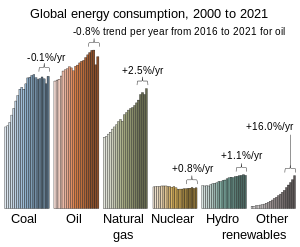
Back انتقال طاقي Arabic Transició energètica Catalan Energiomstilling Danish Energiewende German Ενεργειακή μετάβαση Greek Energia transiro Esperanto Transición energética Spanish Energia trantsizio Basque گذار انرژی Persian Transition énergétique French

An energy transition (or energy system transformation) is a major structural change to energy supply and consumption in an energy system. Currently, a transition to sustainable energy is underway to limit climate change. As much sustainable energy is renewable it is also known as the renewable energy transition. The current transition aims to reduce greenhouse gas emissions from energy quickly and sustainably, mostly by phasing-down fossil fuels and changing as many processes as possible to operate on low carbon electricity.[2] A previous energy transition perhaps took place during the Industrial Revolution from 1760 onwards, from wood and other biomass to coal, followed by oil and later natural gas.[3][4]
Over three-quarters of the world's energy needs are met by burning fossil fuels, but this usage emits greenhouse gases.[5] Energy production and consumption are responsible for most human-caused greenhouse gas emissions.[6] To meet the goals of the 2015 Paris Agreement on climate change, emissions must be reduced as soon as possible and reach net-zero by mid-century.[7] Since the late 2010s, the renewable energy transition has also been driven by the rapidly falling cost of both solar and wind power.[8] Another aim for the energy transition is to reduce the health and environmental impacts of the energy industry.[9] Those impacts are not only about climate change but also about human toxicity, resource use, deaths from air pollution, and others.[9]: 49
Heating of buildings is being electrified, with heat pumps being the most efficient technology by far.[10] To improve the flexibility of electrical grids, the installation of energy storage and super grids are vital to enable the use of variable, weather-dependent technologies.[11] However fossil-fuel subsidies are slowing the energy transition.[12][13]
- ^ Andrew, Robbie. "Figures from the Global Carbon Budget 2021". Retrieved 2022-05-22.
- ^ Tian, Jinfang; Yu, Longguang; Xue, Rui; Zhuang, Shan; Shan, Yuli (2022-02-01). "Global low-carbon energy transition in the post-COVID-19 era". Applied Energy. 307: 118205. Bibcode:2022ApEn..30718205T. doi:10.1016/j.apenergy.2021.118205. ISSN 0306-2619. PMC 8610812. PMID 34840400.
- ^ Davidsson, Simon (2015). "Global Energy Transitions" (PDF).
- ^ Smil, Vaclav. "Energy Transitions" (PDF). Retrieved 2022-06-07.
- ^ "Fossil Energy". Center on Global Energy Policy at Columbia University SIPA | CGEP. Retrieved 2024-04-16.
- ^ "Greenhouse Gas Emissions from Energy Data Explorer – Data Tools". IEA. Retrieved 2024-04-16.
- ^ "The Paris Agreement". United Nations Framework Convention on Climate Change. Archived from the original on 2021-03-19. Retrieved 2021-09-18.
- ^ "Plunging cost of wind and solar marks turning point in energy transition: IRENA". Reuters. 2020-06-01. Archived from the original on 2020-08-10. Retrieved 2020-06-02.
- ^ a b "Life Cycle Assessment of Electricity Generation Options" (PDF). United Nations Economic Commission for Europe. 2021. pp. 49–55. Retrieved 2022-06-01.
- ^ "Are renewable heating options cost-competitive with fossil fuels in the residential sector?". IEA. 2021. Retrieved 2022-06-25.
- ^ Kök, A. Gürhan; Shang, Kevin; Yücel, Safak (2020-01-23). "Investments in Renewable and Conventional Energy: The Role of Operational Flexibility". Manufacturing & Service Operations Management. 22 (5): 925–941. doi:10.1287/msom.2019.0789. ISSN 1523-4614. S2CID 214122213.
- ^ "Abolishing fossil fuel subsidies: a brain teaser rather than a no-brainer".
Reforming fossil fuel subsidies is a complex task for politicians. All in all, our study shows that abolishing fossil fuel subsidies is a no-brainer only for a limited number of subsidies. Abolishing inventoried fossil subsidies does not appear to help the energy transition in all cases. It is important to assess policies from the perspective of adequate pricing of climate damage and other externalities.
- ^ Tripathi, Bhasker. "How fossil fuel subsidies are hurting the energy transition | Context". www.context.news. Retrieved 2024-04-16.
© MMXXIII Rich X Search. We shall prevail. All rights reserved. Rich X Search